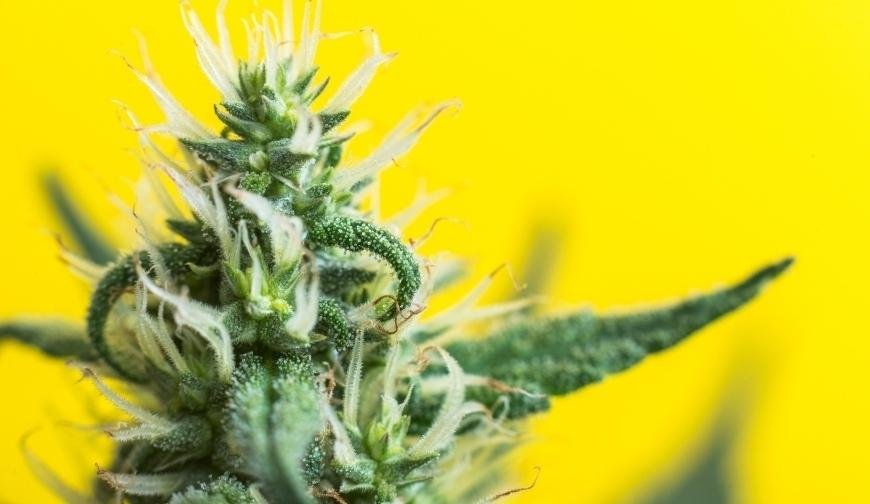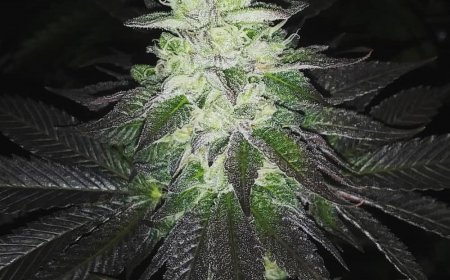Lemon Tree Strain
The Lemon Tree Strain: history, genetics, effects, and growing tips in our detailed guide for a zesty cannabis experience.

When it comes to unique and flavorful cannabis strains, the Lemon Tree strain stands out among the rest. This highly sought-after hybrid is known for its distinct lemon aroma and taste, combined with potent effects that have made it a favorite among recreational users.
In this comprehensive guide, we will delve into the history of Lemon Tree strain and explore its fascinating genetics and lineage. We'll also provide valuable lemon tree strain grow information, so you will be able to cultivate your own strains.
Furthermore, you'll learn about THC, CBD, and other cannabinoid levels present in Lemon Tree weed strain which contribute to its remarkable properties. Finally, we will discuss the effects one can expect when consuming this delightful blend of Lemon Skunk and Sour Diesel genetics as well as describe its characteristic flavor profile.
Table of Contents:
- Overview of Lemon Tree Strain
- History of Lemon Tree Strain
- Genetics and Lineage of Lemon Tree Strain
- Growing of Lemon Tree Strain
- THC, CBD, and Other Cannabinoid Levels
- Effects of Lemon Tree Strain
- Flavor of Lemon Tree Strain
- Frequently Asked Questions Lemon Tree Strain
- Conclusion
Overview of Lemon Tree Strain
The Lemon Tree strain, also known as "Lemon Tree Kush," is a popular balanced hybrid marijuana strain that has gained recognition for its unique flavor profile and uplifting effects. With a 50/50 balance between indica and sativa, this versatile strain offers the best of both worlds, making it an ideal choice for recreational users seeking happy, relaxing experiences.
Lemon Tree boasts vibrant green buds covered in trichomes with hints of yellow and orange hairs. The nugs are dense, sticky, and have a distinct lemon scent that fills the room when broken apart. This tantalizing aroma is complemented by undertones of diesel inherited from its parent strains.
Its quick flowering time and large yields have made it a favorite among growers. Its fame is owed not only to its distinctive taste but also to the convenience of cultivating it in both interior and exterior settings. In addition to being highly sought after by consumers for recreational use, its balanced genetics make it appealing to medical marijuana patients seeking relief from various symptoms without experiencing overwhelming sedation or stimulation.
The unique combination of Lemon Skunk and Sour Diesel genetics has resulted in a truly exceptional strain that stands out among its peers. Its robust flavor profile, which tastes like fresh lemons with undertones of diesel, is highly appealing to cannabis enthusiasts who appreciate complex flavors and aromas. Moreover, the happy, relaxing effects it provides can be euphoric without being overwhelming or causing couch-lock, making it an ideal choice for social gatherings or unwinding after a long day.
Its is a hybrid of the famous Sour Diesel and Super Lemon Haze strains, offering users an energizing high with hints of citrus. It's history dates back to the late 2000s when it first appeared in California medical marijuana dispensaries. Tracing its trajectory, let us explore how it has developed through time.
History of Lemon Tree Strain
The history is as intriguing as its unique flavor profile and potent effects. This balanced hybrid has gained popularity among cannabis enthusiasts for its refreshing lemony taste and uplifting high. Let's dive into the origins of this zesty strain, exploring how it came to be a favorite choice for many recreational growers and users.
Lemon Tree was first bred in California by Kush Brothers Seeds, who aimed to create a well-balanced hybrid that combined the best qualities from both indica and sativa strains. By crossing two popular strains, Lemon Skunk (known for its citrus aroma) and Sour Diesel (renowned for its diesel undertones), they were able to achieve their goal with flying colors.
In no time, Lemon Tree became a hit among Californian cannabis connoisseurs due to its distinct flavor profile and versatile effects that catered to various preferences - whether one sought relaxation or euphoria. Its fame soon spread throughout the West Coast, solidifying its status as a go-to strain in dispensaries across states like Oregon, Washington, Nevada, Colorado.
- 2014 San Francisco High Times Cannabis Cup: The hard work put into developing this exceptional strain paid off when it won an award at the prestigious High Times Cannabis Cup in 2014. This accolade helped boost its reputation among cannabis enthusiasts and growers alike.
- Other Accolades: Lemon Tree's unique characteristics have earned it several other awards over the years, further cementing its place as a top-tier strain in the cannabis world.
The legacy of Lemon Tree continues to thrive today, with many recreational users and growers considering it a staple strain in their collection. Its balanced genetics make it an ideal choice for those looking to experience both indica and sativa effects without leaning too heavily on either side. As its fame increases, this zesty strain is sure to remain a favorite for many in the days ahead.
The history is an interesting one, with its roots tracing back to the early 2000s. Let's delve into the origin and heritage of this unique strain.
Genetics and Lineage of Lemon Tree Strain
The genetics is a fascinating blend of two well-known strains, each with their own unique characteristics. The combination of these parent strains has resulted in a balanced hybrid that offers an enjoyable experience for users.
Lemon Skunk, one half of Lemon Tree's genetic makeup, is a sativa-dominant hybrid known for its zesty lemon aroma and flavor profile. This strain was created by breeding two separate phenotypes of Skunk #1, both selected specifically for their strong citrus traits. Lemon Skunk boasts high THC levels and provides uplifting effects that are perfect for daytime use.
The other half responsible for creating the Lemon Tree strain is none other than the legendary Sour Diesel. Known as "Sour D," this sativa-dominant powerhouse delivers potent cerebral effects along with its signature diesel-like aroma. With origins tracing back to Chemdawg 91 and Super Skunk, Sour Diesel has earned its place among cannabis enthusiasts due to its ability to inspire creativity while providing long-lasting relief from stress and pain.
By crossing these two iconic strains - Lemon Skunk with Sour Diesel - breeders were able to create the harmonious balance found within the Lemon Tree Kush. This exceptional pairing allows users to enjoy the best of both worlds: the uplifting, energetic effects of Lemon Skunk combined with the powerful cerebral high and stress relief provided by Sour Diesel. The result is a balanced hybrid that boasts an impressive flavor profile and a unique set of effects.
The genetic combination showcases what's known as hybrid vigor, where offspring inherit desirable traits from both parent strains. In this case, users can expect to experience a well-rounded high that offers relaxation without sedation, making it perfect for those seeking relief from anxiety or stress while still maintaining focus and productivity throughout their day.
The Lemon Tree strain is a hybrid of unknown origin, but its effects are known to be uplifting and energizing. Growing the Lemon Tree strain can be done indoors or outdoors with careful attention paid to temperature and humidity levels for optimal results.

Growing of Lemon Tree Strain
The Lemon Tree strain is a popular choice among recreational growers for its unique flavor profile and balanced effects. To ensure the best possible results when cultivating this hybrid, it's essential to understand the specific requirements and conditions that will help your plants thrive.
Lemon Tree can be grown both indoors and outdoors, yet it typically yields higher results in a controlled environment where temperature, humidity, and light exposure are monitored. However, if you have access to a sunny outdoor location with warm temperatures between 70-85°F (21-29°C), growing Lemon Tree outdoors may still yield satisfactory results.
Lemon Tree prefers well-draining soil rich in organic matter. This type of soil ensures proper root development while providing adequate nutrients for healthy growth. Some recommended options include coco coir or peat moss-based mixes.
- Coco Coir: A sustainable option made from coconut husks that promotes strong root systems and excellent water retention.
- Peat Moss: An organic material derived from decomposed plant matter which provides excellent moisture control while also offering natural acidity beneficial for cannabis plants.
To support optimal growth throughout each stage of development, provide your Lemon Tree plants with appropriate levels of macronutrients such as nitrogen (N), phosphorus (P), and potassium (K). Calcium, magnesium, and iron are also necessary for a Lemon Tree to thrive. You can find pre-formulated cannabis-specific nutrient solutions to simplify the feeding process.
A general feeding schedule for Lemon Tree plants is as follows:
- Vegging Stage: High levels of nitrogen with moderate amounts of phosphorus and potassium.
- Blooming Stage: Decrease nitrogen levels while increasing phosphorus and maintaining moderate potassium levels.
- Flowering Stage: Gradually reduce nitrogen further while maintaining high phosphorus and potassium concentrations until harvest time approaches.
Lemon Tree thrives under a consistent light cycle of 18 hours on/6 hours off during the vegetative stage. Once you're ready to initiate flowering, switch to a 12-hour on/12-hour off light cycle. Using energy-efficient LED or HID lights will provide optimal results without generating excessive heat that could damage your plants.
Maintaining proper humidity is also crucial when growing Lemon Tree strain indoors; aim for relative humidity between 40-50% throughout the entire grow cycle. To achieve this balance, consider using dehumidifiers or air conditioners in conjunction with oscillating fans to circulate air evenly around your grow space.
Growing is a rewarding experience, as it can provide high-quality cannabis with an intense flavor and aroma. To maximize the rewards of cultivating Lemon Tree, familiarizing oneself with its cannabinoid concentrations is essential.
THC, CBD, and Other Cannabinoid Levels
In this section, we will delve into the cannabinoid content of this popular hybrid strain.
Lemon Tree boasts a relatively high THC (tetrahydrocannabinol) content that typically ranges between 17% and 25%. This makes it an ideal choice for those seeking a strong cerebral buzz accompanied by uplifting effects. However, due to its potency, novice users should approach this strain with caution as they may find the experience overwhelming.
In contrast to its substantial THC levels, Lemon Tree has a rather low CBD (cannabidiol) content - usually less than 1%. While some strains are bred specifically for their medicinal properties or higher CBD ratios in order to counteract psychoactive effects associated with THC consumption; Lemon Tree's focus remains on recreational use and providing an enjoyable user experience.
In summary, while Lemon Tree may not be an ideal choice for those seeking high CBD content or specific medicinal benefits, it remains a popular option among recreational users who appreciate its potent THC levels and uplifting effects.
The THC, CBD and other cannabinoid levels of the Lemon Tree Strain can provide a unique experience to users. Having established the Lemon Tree Strain's cannabinoid content, it is crucial to consider its potential impacts on users.
Effects of Lemon Tree Strain
Its unique combination of genetics from Lemon Skunk and Sour Diesel results in a range of experiences that can be enjoyed by all types of cannabis enthusiasts.
Lemon Tree's uplifting effects are one of the first things you'll notice after consuming this strain. The cerebral high kicks in quickly, providing a burst of euphoria that leaves users feeling happy and uplifted. This makes it perfect for social situations or when you need a mood boost to get through your day.
Beyond its uplifting properties, Lemon Tree also has the potential to stimulate creativity in its users. Many people report feeling inspired and motivated after consuming this strain, which can help with tasks requiring focus or artistic endeavors such as painting or writing.
In summary, the Lemon Tree strain offers a wide range of enjoyable effects that cater to both recreational and medicinal users alike. Lemon Tree's unique genetic profile makes it an ideal strain for recreational and medicinal users alike, providing a stimulating yet calming experience that is sure to please.
The effects are varied, with some users reporting a feeling of euphoria and others experiencing an energizing effect. This particular strain stands out due to its distinct, citrus-like flavor.
Flavor of Lemon Tree Strain
The flavor profile of the Lemon Tree strain is one that stands out amongst its peers, offering a delightful combination of tastes and aromas. This section will explore the intriguing flavors that this special strain offers.
Lemon Tree boasts an enticing aroma that draws users in with its strong citrus scent. As you might expect from a strain named after a fruit-bearing tree, it exudes notes of fresh lemons accompanied by undertones reminiscent of Sour Diesel. The pungent diesel smell combines perfectly with the zesty lemon fragrance to create an invigorating olfactory experience.
When it comes to taste, Lemon Tree does not disappoint either. Upon inhaling the smoke or vapor produced by this hybrid marijuana strain, your taste buds are greeted with bold flavors mirroring its aromatic properties. A burst of tangy lemon dominates your palate while subtle hints of earthiness and diesel linger in the background.
Overall, the Lemon Tree strain offers a delightful sensory experience for both novice and seasoned cannabis enthusiasts alike. This strain's one-of-a-kind combination of aromas and tastes make it perfect for those looking to shake up their usual cannabis consumption.

Frequently Asked Questions Lemon Tree Strain
How good is Lemon Tree strain?
Lemon Tree strain is highly regarded for its balanced effects, offering a combination of uplifting cerebral high and relaxing body buzz. Its unique lemony flavor profile and potent THC levels make it popular among recreational users seeking an enjoyable experience.
What strain is Lemon Tree?
Lemon Tree is a hybrid cannabis strain that comes from the cross between the legendary strains Sour Diesel and California Orange. This 50-50 indica-sativa blend provides a well-rounded set of effects suitable for various occasions.
Is Lemon Tree strain strong?
Yes, Lemon Tree strain can be considered strong due to its relatively high THC content ranging from 17% to 25%. The potency varies depending on cultivation techniques, but generally speaking, this hybrid offers powerful psychoactive effects sought after by experienced consumers.
What is the best strain of lemon?
While "best" may vary based on personal preferences, some top-rated lemon-flavored strains include Super Lemon Haze, Lemon OG Haze. These strains are known for their distinct lemony aroma and flavor, as well as providing uplifting effects.
Conclusion
Overall, the Lemon Tree Strain is a popular choice among young adults who enjoy growing and taking drugs. Its unique flavor profile and potent effects make it a favorite in the cannabis community. The strain's lineage and genetics are also interesting to note for those interested in its history.






































































































































